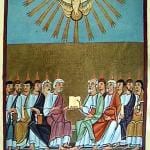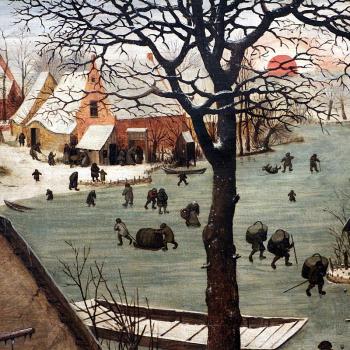But then there are my friends who seem driven to Leftism precisely on account of their orthodox beliefs. Christos Razdajetsja (Christ is born!)! Slevite Jeho (Glorify Him!), as we say in the Ruthenian Byzantine Catholic Church. The Incarnation means that God has become man, that He knows our pain, has stooped (so to speak) to our level. For one who believes this, and who believes that we ought to be like God (what is traditionally called theosis or deification), it makes sense to accept that it is our duty to be there for and with others, to ease their pain, to comfort them. Who can hear this in his heart of hearts and not feel moved to action on behalf of fallen creation?
Adam was made from dust, yet he shared God’s life-giving breath. He was deceived by woman and fell, but from the dead, he saw Christ born of woman. He shouted, “For my sake Thou hast become like me. Holy art Thou, O Lord!”
Glory to Thee, our God, glory to Thee.
Thou hast assumed a body of lowly clay, O Christ. By sharing our humble flesh, Thou hast made our race partakers of divinity. By becoming mortal man yet remaining God, Thou hast raised us from death to life. Holy art Thou, O Lord! (Canon of the Nativity of Our Lord)
Or this:
Thou art the Expectation of the nations, O Christ, foretold by Jacob in days of old. Thou have sprung from Judah’s tribe, to plunder the might of Damascus and the spoils of Samaria, replacing error with faith acceptable to God. Glory to Thy power, O Lord.
[…]
O Father of Mercies, as God of peace, unto us hast Thou sent forth the Angel of great counsel Who brings His peace. Therefore watching through the night we are guided by the light of the knowledge of God, therefore, we glorify Thee, O Lover of Man!
Glory to Thee, our God, glory to Thee.
Thou wast registered as Caesar’s subject, O Christ, in obedience to his decree. We were slaves of sin, and subject to the hateful enemy; by Thy poverty Thou hast set us free! Thou wast united to our nature in every way. Though we were formed from dust, by this communion we are made divine! (Canon of the Nativity of Our Lord)
The emphasis here is on being perfect as our Heavenly Father is perfect, on loving mankind as God loves us, on bearing the joy of the Incarnation to the world through righteous fruits.
Given this fact, it seems totally reasonable to me that people might want to stand up for those people or groups who stand apart from society, who seem least likely to know that God loves them and wills their transformation through the redemptive miracle of Christ’s taking on flesh. To say that we easily become the hardhearted people of Bethlehem who have no room for the Holy Family may, at this point, be a mere platitude, but its roots are sound, its theology orthodox. The Incarnation is a miracle; it is both prophesied and unexpected, clear and inscrutable, shocking and comforting. We, two-thousand years distant, seem to find it even easier to sit in ignorance, minds assenting to what we hear at liturgy, but without the mettle to live the Gospel, to bring Christ to the people of the world. Some bishops, however, still stand for such evangelization without proselytization—something that might sound “Left” to many.












